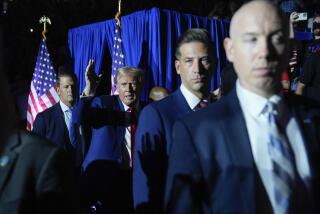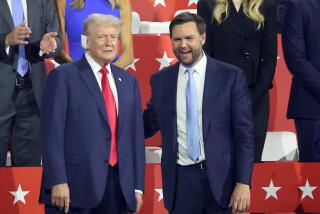Bhutto’s death may shift campaign focus
- Share via
DES MOINES — On Wednesday, Sen. Hillary Rodham Clinton warned Iowa’s Democratic voters to consider which presidential candidate was best equipped to confront “unpredictable” problems in an uncertain world.
About 24 hours later, the unpredictable happened.
Whether the assassination of former Pakistani Prime Minister Benazir Bhutto will prompt voters to reconsider which candidate should lead the country is unclear. But it is clear that some campaigns think when the debate turns to foreign policy and dangers from abroad, their candidates benefit and others suffer.
Clinton and Republicans John McCain and Rudolph W. Giuliani are seen by Iowa and New Hampshire voters as having the best credentials to deal with national security issues.
In Iowa, Clinton is trying to focus voter attention on the job of the presidency, hoping to heighten that advantage.
The New York senator named her final trip through the state before Thursday’s caucuses “Big Challenges, Real Solutions: Time to Pick a President Tour” -- an attempt to shift the discussion away from whether she is likable, the one quality in which she lags behind her chief rivals.
“With the assassination of Benazir Bhutto today, the world once again is reminded of the dangers facing those who pursue democracy and free elections in Pakistan and elsewhere in areas that are rife with conflict and violence and extremism and anti-democratic forces at work,” Clinton said. She said later that the events in Pakistan “are a stark reminder of how important it is for as many Iowans as possible to be part of charting our country’s future.”
On the Republican side, the crisis in Pakistan helps McCain and Giuliani shift the focus to their strengths -- and away from the domestic concerns such as social issues, immigration and taxes that have benefited former Massachusetts Gov. Mitt Romney and former Arkansas Gov. Mike Huckabee.
Coincidentally, the crisis in Pakistan coincided with a new Giuliani television ad in which the former New York mayor discusses his leadership after the Sept. 11 terrorist attacks.
And Giuliani was quick to issue a statement Thursday calling the incident a “reminder that terrorism anywhere -- whether in New York, London, Tel Aviv or Rawalpindi -- is an enemy of freedom.”
McCain, a Vietnam veteran and Arizona senator with years of experience on the Senate Armed Services Committee, was the most blunt of any candidate in assessing the political meaning of the Bhutto assassination.
Appearing at an Elks Lodge near Des Moines, he repeatedly mentioned his knowledge of the region. He noted that he had traveled to the remote area on the Pakistan-Afghanistan border believed to be harboring terrorists, such as Osama bin Laden, and said he had had a rapport with Bhutto and has one with Pakistani President Pervez Musharraf.
“My theme has been throughout this campaign that I am the one with the experience, the knowledge and the judgment,” McCain said. “So perhaps [the assassination] may serve to enhance those credentials or make people understand that I’ve been to Waziristan, I know Musharraf, I can pick up the phone and call him.”
McCain’s words resonated with Mark Nemmers, a 51-year-old Republican who had planned to back Huckabee -- until the assassination. Now he is taking a serious look at McCain.
“I didn’t expect the Pakistan thing to take the turn that it did, but now that it has it changes the whole picture,” said Nemmers, who lives in the Des Moines suburb of Urbandale. “It represents a great deal of unrest for the world, and I think the next president we need is one who can deal with this unrest.”
McCain also said he would “hate for anything like this to be the cause of any political game for anybody.”
But when asked whether his rivals could deal with such a crisis, McCain did not shy away from striking a contrast.
He noted that Romney “doesn’t have any experience there” and said that, although Giuliani performed well after Sept. 11, “I don’t know how that provides one credentials to address national security issues.”
McCain’s comments could boost his hopes in Iowa, where he trails Romney and Huckabee. He wins the highest marks when Republican voters who plan to attend the caucuses are asked who would be best at fighting terrorism and protecting national security -- with 30% naming McCain, 14% Huckabee and 11% Romney, according to a new Times/Bloomberg poll.
The survey showed a similar advantage among Iowa Democrats for Clinton, who was judged as best by 36% -- compared with 21% who picked former North Carolina Sen. John Edwards and 19% who picked Illinois Sen. Barack Obama.
The turn of events could be particularly troublesome for Obama, who has gained ground in recent weeks thanks to missteps by Clinton that have raised questions about her authenticity and likability.
The former first lady had been strongest in the summer and early fall when she was able to paint the first-term senator as “naive” on foreign affairs. And she has long scored high marks from likely Democratic voters as the best qualified to end the war in Iraq -- even though she has refused to recant her vote to authorize the war.
Obama aides sought Thursday to neutralize any benefit to Clinton -- and turn the focus to the type of character question that polls show benefits Obama.
Following a Thursday morning speech by the Illinois senator, Obama advisor David Axelrod told reporters that Clinton had voted for a war that distracted the U.S. from Pakistan and Afghanistan and emboldened Al Qaeda, which he said might have been responsible for Bhutto’s death.
“That’s a judgment she’ll have to defend,” Axelrod said.
His comment drew a furious response from a Clinton spokesman, Jay Carson, who accused the Obama campaign of politicizing the Bhutto assassination.
Most candidates chose their words carefully to avoid appearing overly political in a time of tragedy.
But each tried to sound authoritative and knowledgeable and, in some cases, personally close to Bhutto -- even those who do not enjoy the same advantages as Clinton and McCain.
Huckabee, who leads the GOP field in Iowa, stumbled a bit when, speaking in Florida, he appeared not to realize that Musharraf had lifted martial law under U.S. pressure this month.
Edwards had more success: He reached Musharraf by phone and told reporters that he had encouraged him to go ahead with parliamentary elections scheduled for January.
--
Times staff writers Joe Mathews, Scott Martelle, Seema Mehta, Peter Nicholas, Maeve Reston and Carol J. Williams contributed to this report.
More to Read
Get the L.A. Times Politics newsletter
Deeply reported insights into legislation, politics and policy from Sacramento, Washington and beyond. In your inbox twice per week.
You may occasionally receive promotional content from the Los Angeles Times.










